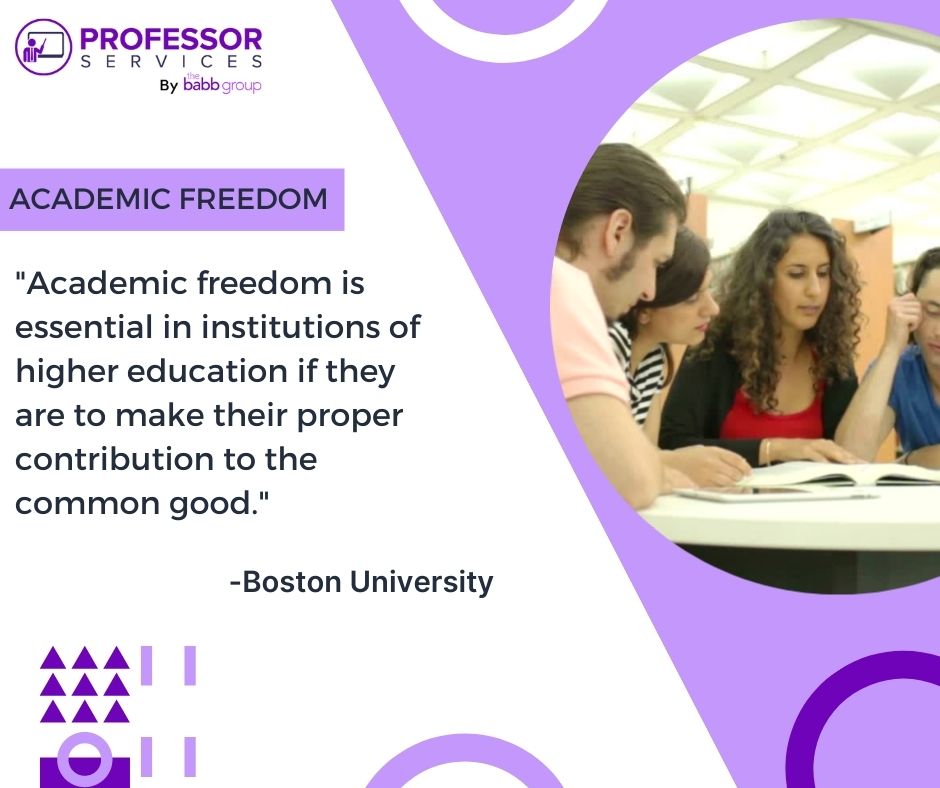Academic Freedom Policies
Academic freedom is a fundamental principle in the world of academia. It ensures that faculty members are free to pursue their research interests and express their opinions without fear of retaliation or censorship. However, academic freedom also comes with responsibilities and, these days, the risk of getting canceled. Faculty members must use their freedom responsibly and in the best interest of their students, colleagues, and the broader academic community.
What Is Academic Freedom
The American Association of University Professors (AAUP) offers multiple resources on academic freedom. While there are new challenges to academic freedom every year, instructors, especially adjuncts, can practice freedom while adhering to institutional guidelines.
At the heart of academic freedom is research conducted for the common good instead of to further the interest of individuals and institutions. Most colleges and university policies include similar language.
Academic Freedom Best Practices
Here are some best practices for faculty members to ensure that they exercise their academic freedom responsibly:
- Familiarize yourself with the academic freedom policies and guidelines at the institution. Ask clarifying questions!
- Respect the opinions of others. Academic freedom means you have the right to express your opinion. Still, it does not mean you have the right to disrespect the views of others or express racism or hateful language. Be respectful of your colleagues’ ideas and engage n constructive dialogue.
- Use evidence-based research. As a faculty member, your study and teachings should be based on evidence and facts, not personal biases or opinions. Your research should be transparent and open to scrutiny by other scholars.
- Recognize the impact of your words and actions: Your words and actions as a faculty member can significantly impact your students, colleagues, and the broader academic community. Be mindful of the potential impact of what you say or do.
- Ask your institution about its use and policies on trigger warnings. The AAUP issued a report in 2014 on the use of trigger warnings. Since then, social media and cancel culture are more common and can impact how and when instructors and institutions may consider using them.
These statements alert students to content that may involve sensitive information that triggers an emotional response tied to a student’s personal experience. As you develop relationships with students and create a class culture, check in with students throughout the semester to gather information on what they may need in terms of information about resources.
- Foster a diverse and inclusive academic environment. Academic freedom thrives in a diverse and inclusive environment. As a faculty member, you should actively work to create an environment that welcomes and respects diversity and inclusion. Ask students open-ended questions. Encourage multiple points of view in discussions and model openness to ideas and differing opinions for students.
- Adhere to ethical principles. Academic freedom does not mean you are exempt from ethical principles. Your research and teachings should adhere to the highest ethical standards and be transparent about potential conflicts of interest.
- Foster academic rigor. As a faculty member, you should strive to maintain academic rigor in your research and teachings. This means adhering to established standards and methodologies in your research and ensuring that your teachings are evidence-based.
- Participate in peer review. Peer review is critical to academic freedom. You should participate in peer review as a reviewer and author to ensure the academic community is held to the highest standards.
Get Professional Advice
If you’re new to teaching and adjuncting, talk to an experienced Professor Services mentor about what academic freedom means for instructors and how to implement best practices. By following these guidelines and getting professional advice, faculty members can exercise their academic freedom responsibly and in the best interest of their students, colleagues, and the broader academic community. Academic freedom is a precious commodity that should be protected and used wisely.
Sources:
https://www.aaup.org/JAF4/academic-freedom-below-toward-adjunct-centered-struggle#.ZDRpeHbMK3B
Angela
Latest posts by Angela (see all)
- The Art of Connection: Networking and Professionalism in Academia - July 25, 2024
- Got the Teaching Job? Now, You Need To Attend the Faculty Training - July 1, 2024
- Higher Education Trends: Insights from Our COO, Sheila Fry - June 20, 2024
